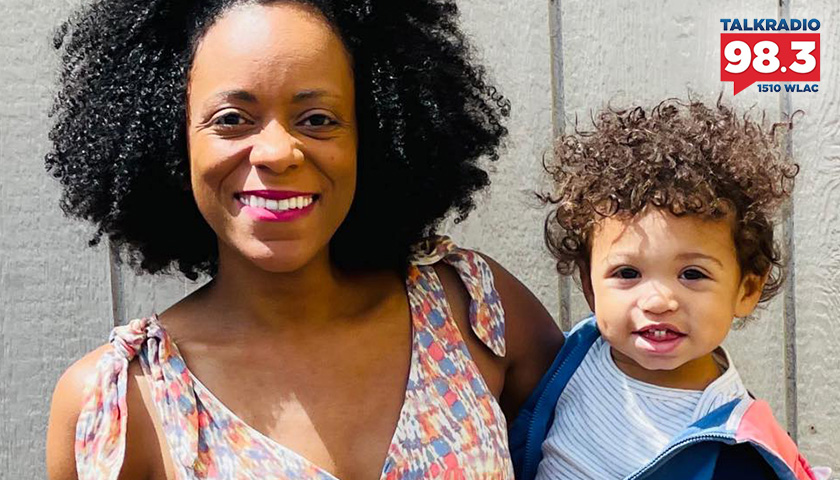Live from Music Row Tuesday morning on The Tennessee Star Report with Michael Patrick Leahy – broadcast on Nashville’s Talk Radio 98.3 and 1510 WLAC weekdays from 5:00 a.m. to 8:00 a.m. – host Leahy welcomed Christina Bennett of the anti-abortion nonprofit Live Action to the newsmaker line to discuss her personal story as a preborn girl being scheduled for abortion and her 17 years of pro-life activism.
Leahy: On the newsmaker line we are joined by Christina Bennett, a correspondent with Live Action. Good morning, Christina.
Bennett: Good morning. Thanks for having me on.
Leahy: Christina, you have quite a personal story. Tell us a little bit about it.
Bennett: Yes, I do. I was scheduled to be aborted. My mother was being pressured by my father, and he was coercing her to get an abortion.
She went to her church and told her mentor, and her mentor told her, if you come back to this church, I’ll put my foot in the door and not let you in, because she was not married and she was pregnant.
So she rejected her, and she went to Mount Sinai Hospital in Hartford, Connecticut. She met with the counselor. The counselor told her, abortion is the best decision for you to make.
Let’s put this white hospital robe on you and just go into the waiting room and the abortion doctor will call your name. But between the counselor’s office and the waiting room, she stopped for a moment to cry.
And an elderly black janitor saw her crying, walked up to her and said, do you want to have this baby? Even though my mom paid for the abortion, she said, yes. And the janitor said, God will give you the strength that empowered her.
She went back into the waiting room. The doctor called her into his office. There was blood on the floor from the last abortion. And she said, no, I’ve changed my mind. I’m keeping my baby. And he got upset and said, you’ve already paid for this.
You’re just nervous, you’re going to go through with it. And she said, no, I changed my mind. I want to keep my baby. He yelled at her, don’t leave this room. But she ran out, and she saved my life.
But she kept it a secret for over 20 years until I was in college. And I was at a church service, and somebody approached me and said, God wants you to know something remarkable happened around the time of your birth.
And I asked my mother, did anything remarkable happen in my early childhood, around the time of my birth? And she was very hesitant. But then she told me that she met this woman – who she calls an angel – before I was born, and she helped save my life.
Leahy: Wow. And so now tell us the rest of the story. Your mother, was she not married at the time? How did she raise you? What happened?
Bennett: So she wasn’t married at the time, but she did get married. So credit to my dad. My dad, he tried to make it work. They got married, but it only lasted one year because they had a lot of issues in their relationship.
Leahy: She married your biological father, is that correct?
Bennett: She did, but it only lasted for one year. The marriage only lasted for one year. Then she ended up moving. So we moved around a lot. I grew up just in a family of going back and forth because of the divorce.
So I was in Connecticut and California. I was in a different elementary school, first grade, second grade, third grade, fourth grade, fifth grade.
So I had a lot of chaos in the early years, but my mother did go back into the church, and she ended up having a close relationship with God, and that caused me to then get involved in church.
And so I grew up just … I wasn’t aware of that story. I never heard abortion talked about in my home. And most of my childhood, I grew up in Connecticut, which is a very liberal, progressive state. So abortion was never talked about, even in the churches that I attended.
And so I just grew up wanting to go into maybe journalism or something. I wasn’t exactly sure what I wanted to do with my life. And then when I got to college and I discovered this story that opened up my eyes to the reality of abortion, and that led me to eventually become a pro-life advocate.
I’m an African American woman in a black family, mostly Democrats. So I ended up taking a very different path than my whole family.
I became a conservative Republican. I became pro-life. I just became just different than everybody in my family. But because of the story and because of the calling to fight for life.
Leahy: Where did you attend college?
Bennett: I went to a school called Southern Connecticut State in New Haven.
Leahy: When did you start to become more of a conservative pro-life activist? What was your age – 20 or 21?
Bennett: Yes. I was in my early 20s when I started to become pro-life, and I was just listening to other people’s stories. I heard my story from my mother, but then I thought, well, okay, I wonder if anybody else has stories like this.
So I began to listen to their stories. And the more I heard, the more I was horrified. People telling me about … passing a baby in a toilet. I mean, just really horrifying stories, the pain of women who had abortions.
And now my personal stories. I was a virgin until I got married at 32, so I wasn’t someone that had any kind of experience personally with getting pregnant out of marriage or needing an abortion.
So I was just listening to other people’s stories, and then I was understanding how horrible it was. And then I realized that in order to fight for life, I had to vote for pro-life candidates. So that was kind of a new thought for me, and I explored it some, and I realized that this is the most important issue to me, and I believe that it’s a primary issue on God’s heart.
And I began to realize that Margaret Sanger, through Planned Parenthood, changed legislation. She changed the laws in order to accomplish Roe versus Wade, which is after she was gone. But Griswell versus Connecticut, that was the Connecticut Supreme Court case.
She strategically fought to change the laws in order to allow for abortion. And so I realized that I needed to also get involved with voting for people that would do the same thing. That they would fight through legislation to protect lives. That’s how I ended up becoming a conservative.
Leahy: It sounds like you’ve been a pro-life activist for, what, about 10 years now?
Bennett: Actually, 17.
Leahy: Seventeen years?
Bennett: Yes, 17, almost 18 years.
Leahy: What has changed during that period of time?
Bennett: Roe v. Wade got overturned. So that’s probably the biggest thing, that’s the biggest thing that has changed in our country. And I would also say what’s changed is the way that people talk about abortion and the way they fight for it.
Because I would say 10 to 15 years ago, when people talked about abortion, they talked about it like, oh, we want it to be safe and legal and rare and everything else.
And now it’s like the mask is off and people are just abortion on demand, abortion without apology. They talk about abortion as self-care. They talk about abortion as reproductive freedom and reproductive justice.
There’s just this Twitter campaign called Shout Your Abortion. So people have moved away from this, like, moderate, false version of, oh, we just want to have this as an option to all the way abortion up to nine months, and we’re not going to apologize for it.
So that’s changed in the culture. And then I would say, just when it comes to things that have happened, like in our government during the pandemic, President Biden allowed for the abortion pill to be sent out by mail.
And then in addition to that, he said, okay, now it can permanently go out through the mail. And so now we are living in a time when the abortion pill can go out through mail. So we’re looking at 50 or more percent of abortions that are now being done through a pill, through the chemical abortion pill. And so that’s something that’s changing.
On the positive side, we’ve had hundreds of abortion clinics that have shut down in the past 10 to 15 years. We’ve had a huge rise in activism. Former abortion clinic workers like Abby Johnson are coming out of the industry, talking about we’ve had a rise in pregnancy resource centers, over 2,000 of them, all across the country, working to help women and support them.
We’ve had a lot of work done with post-abortion healing and support groups and men’s groups. So there’s a lot that the pro-life movement has done when it comes to helping women and families and encouraging people to tell their stories.
And then there’s a lot happening on the governmental side. And then of course, right now we’re in a battle for the states. So right now, depending on what state you’re living in, either your state is trying to enact legislation to become more pro-life or, like my state of Connecticut, they are trying to become an abortion sanctuary state.
Listen to the interview:
– – –
Tune in weekdays from 5:00 – 8:00 a.m. to The Tennessee Star Report with Michael Patrick Leahy on Talk Radio 98.3 FM WLAC 1510. Listen online at iHeart Radio.





